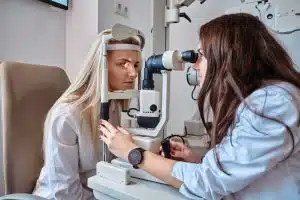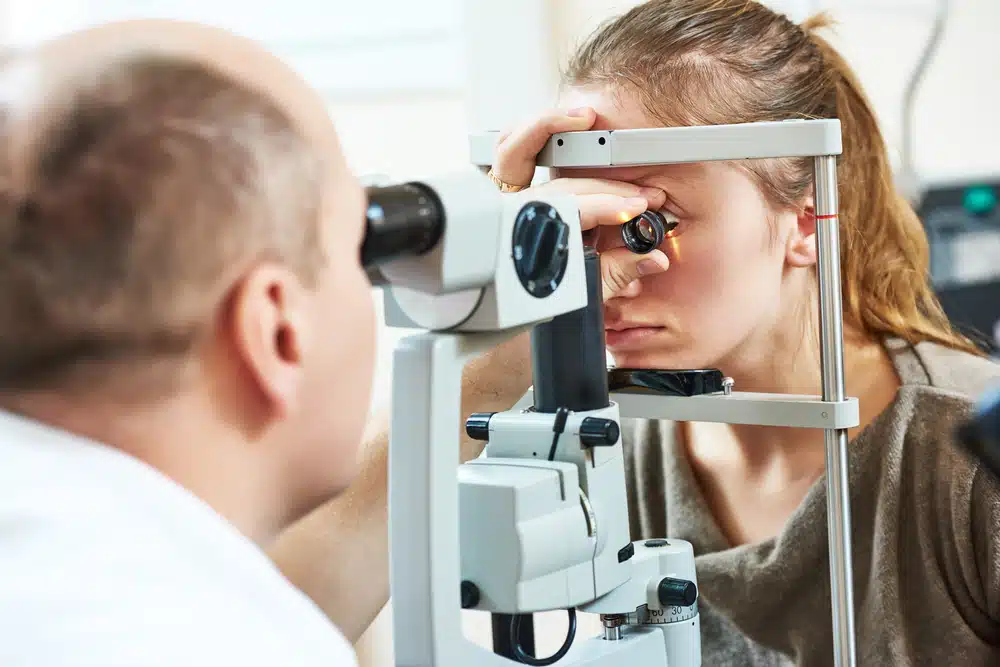
All major aspects of your work as an ophthalmic or dispensing optician are regulated by the Opticians Act and Orders, Rules and Regulations made under it. A practising optician is required to register with the General Optical Council (GOC), which holds statutory regulation powers.
There are statutory rules governing the GOC that must be followed by all registered members. In addition to continuing education and training (CET), supervision of trainees, contact lens fitting, and advertising and marketing, these regulations cover both business and clinical aspects of opticians’ operations.
At an early stage in your business planning, you should familiarise yourself with the key provisions of the Opticians Act and the GOC Rules.
There are also professional conduct guidelines and standards for opticians established by all the major professional bodies.
What licences does an optician need?
Here are the licences needed by a working optician today.
Opticians’ registration
Under the Opticians Act, you are required to register with the General Optical Council (GOC) if you practice optics (sight testing and/or dispensing). In order to register with the GOC, you must hold a suitable qualification from an approved institution. A continuing education program (CET) and meeting professional standards are required for continuing registration. On their website, you can find full contact information for the GOC.
In order to work for the NHS, you must be registered on the ophthalmic performers list of the commissioning body. When you register, you must either provide a recent enhanced Disclosure and Barring Service (DBS) background check or consent to one being conducted.
In order to register as an assembly of medical devices with the Medicines and Healthcare products Regulatory Agency (MHRA), you must perform on-site spectacle glazing (cutting and fitting finished lenses into frames), receiving remotely edged lenses and fitting them into new frames, or surfacing work. The registration fee is a one-time charge. On the Gov.uk website, you can find more information about medical devices. Opticians can find guidance on the website of the Association of Opticians (AOP).
A registration requirement does not apply to re-glazing existing frames, repairing broken spectacles, and making final adjustments to finished appliances.
Orthoptists’ registration
Orthoptists – professionals who coordinate eye alignment and treat eye movement disorders – must be registered with the Health and Care Professions Council (HCPC). The qualification they hold must be approved and they must meet certain standards to be registered. A specialist orthoptist might be employed by your optical practice. You can find more information on the HCPC’s website or by contacting them.
Data protection
As you keep comprehensive medical records – almost certainly computerised – about your patients, you will be required to register with the Information Commissioner’s Office (ICO).
Selling general insurance
Optical practices may need to be regulated by the Financial Conduct Authority (FCA) if they sell, advise on, arrange, or assist with the sale of general insurance (for example eye care insurance or spectacle insurance). In this case, you can either become a direct FCA-authorised firm or act as an authorised principal’s ‘appointed representative’. For more information, get in touch with the FCA.
Retailing and fair trading
To protect the interests of consumers, retail outlets are subject to a variety of regulations. Clearly displaying the retail price of goods and services is required, for example. As a buyer, you are responsible for ensuring the quality and suitability of all goods and services.
Consumer protection regulations specifically prohibit dishonest practices like faking credentials and utilisingscare tactics against consumers.
Visit Gov.uk and Trading Standards Business Companion for more information on consumer protection and fair trading legislation.
Child protection
A background check by the Disclosure and Barring Service (DBS) isn’t a legal requirement at the moment for staff in opticians practices, but it’s a good idea if they come into contact with children and/or vulnerable adults often. A clinician like an optician must undergo these checks before a NHS commissioning body will accept him or her as a new applicant to their NHS performers list and contract with him or her to provide NHS services. The ‘enhanced’ check required for trainee opticians at the beginning of their training is always included.
The DBS requires employers to notify the agency if they suspect a member of their team may harm a child or vulnerable adult. If you know that someone has been barred from working with vulnerable people by the DBS, you should never employ them in such a position.
The DBS section of the Government website more information on background checks and information referrals.
Substances that could be used to make explosives
Special regulations have been implemented to prevent the wrong hands from getting hold of substances that could be used to make explosives. It is possible for a member of the public with a licence to obtain and possess some substances, which are normally only available from specialists.
Despite not being regulated, other substances pose potential risks. In many contact lens sterilising products, hydrogen peroxide is found in weak solutions, which are referred to as ‘reportable substances’. Strong solutions of hydrogen peroxide are regulated.
The police Anti-terrorist Hotline should be notified of any suspicious transactions involving regulated or reportable substances. The customer could be suspicious of a transaction for a variety of reasons, such as insisting on paying cash and/or requesting an unusually large amount of a product.
On the Government website, businesses can find more information about chemicals that need to be reported.
Carrier bag charge
SMEs (with fewer than 250 full-time equivalent employees) in England are exempt from the 5 pence charge. The gov.uk website provides detailed guidance.
Whenever a single-use carrier bag is provided by a retailer in Wales or Scotland, customers must be charged at least 5 pence. Any type of single-use bag falls under this category, whether it is plastic, paper, or starch-based. On the websites for Gov.Wales and Zero Waste Scotland, detailed guidance is available.
The Northern Ireland government requires retailers to charge a 5 pence levy on all single-use and reusable bags with a retail price under 20 pence (including free bags).
Health & Safety, fire
Health and safety regulations at work and fire safety regulations must be followed.
Employment legislation
The employment legislation must be followed by anyone who employs staff. Among the key areas of legislation are recruitment, employment contracts, pay, working hours, holidays, and employment policies, as well as sickness, maternity, paternity, discrimination, discipline, grievances, dismissals, and redundancies.
Other relevant legislation
- It is the right of individual clients/patients to access their health records relating to them (as well as the equivalent legislation for Northern Ireland) under the Access to Health Records Act and Data Protection Act. There is also similar legislation applicable to medical reports.
- Sight Testing (Examination and Prescription) Regulations, which specify how sight tests must be conducted and require you to provide every patient with a written prescription after a sight test.
- As required by the NHS (General Ophthalmic Services) Amendment Regulations, you must inform a patient’s doctor if he or she is diagnosed with diabetes or glaucoma
- Certain ophthalmic drugs are regulated by the Medicines Act (additional legislation governs opticians’ prescribing).
- Spectacles, contact lenses, and other ophthalmic appliances are regulated by the Medical Devices Regulations
Records keeping and other administrative procedures are covered in other regulations and orders that govern contracts with the NHS.
Insurance for an optician
Describe how your business will operate so a professional insurance broker or insurer can advise you about the type of insurance coverage you need and what else you should consider. The following may be included:
- Employer’s liability
- Public liability
- Product liability
- Professional indemnity and medical malpractice/negligence
- Premises and premises contents
- Motor insurance (for business vehicles)
- Loss of earnings and locum cover
In order to mitigate your risk of medical malpractice, you should get insurance that covers all of your practice activities. Ensure that you and the practice are covered both individually and collectively. Inform locums and other freelancers about the insurance position if they work on the premises.
Conclusion
Optician need to ensure that the hold the correct insurance both for employees and staff. In recent years opticians have seen a growth in negligence claims so you must hold medical malpractice insurance to defend future legal issues against the optometrists.
Lee Jones is a seasoned Business Finance Specialist with over two decades of invaluable experience in the financial sector. With a keen eye for market trends and a passion for helping businesses thrive, Lee has become a trusted advisor to countless organizations seeking to navigate the complexities of finance.


